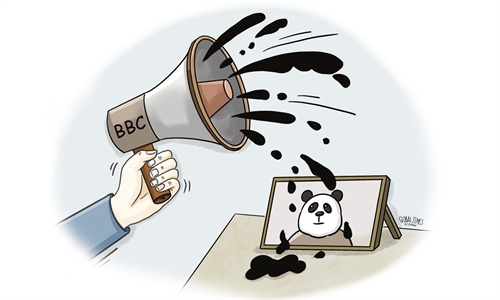No reason for BBC to associate China with its continuous ‘retreat’: Global Times editorial

Photo: VCG
On Monday, local time, Tim Davie, director general of the British Broadcasting Corporation (BBC), questioned the UK government's budget cuts to the BBC during a forum speech. He argued that these cuts are forcing the BBC to "retreat" from regions such as Africa, the Middle East, and Latin America, allowing China and Russia to fill the gaps. He cautioned, "Free and fair reporting has never been more essential - for global democracy and for audiences of most need around the world," and that "further retreat of the BBC World Service should be a cause for serious global concern." Following Davie's remarks, some British conservatives echoed his sentiments, asserting that "Western democracies are losing the information war," and that the BBC World Service should be "protected."
These days, constantly making an issue of the "China threat" has almost become a standard formula for Western media. "China threat" has not only become a convenient scapegoat for Western governments' pressing issues but also a go-to excuse for Western institutions to ask for funding. Ten years ago, the UK government stopped funding most of BBC's World Service's projects. To cut costs, in 2022, the BBC announced the closure of its Arabic and Persian radio services, along with hundreds of job cuts. Currently, the UK Parliament is conducting an inquiry into the future funding of the World Service. One of the reasons behind Davie's recent remarks is his attempt to use public opinion to "whine about being broke" to the UK government, urging it to provide financial support and thus alleviate the BBC's operational pressure.
From Davie's speech, we can discern a certain logic that suggests the strength of a media outlet's influence depends primarily on its financial resources. Under such logic, China's growing influence in Global South countries is due to its media having "more money." This reflects the long-standing and widespread ideological superiority complex among some Western mainstream media figures.
A simple truth is that when Britain's condescending diplomacy is no longer accepted by more Global South countries, it is almost inevitable for the BBC, which heavily relies on funding from the British Foreign, Commonwealth and Development Office, to retreat from certain regions.
From another perspective, why does the BBC, as a media organization, perceive a "China threat"? This perception is clearly not due to any interference from China in the BBC's operations and development.
China's openness and cooperation, including the Belt and Road Initiative cooperation, have generated numerous stories worldwide, almost all of which revolve around themes of peace, cooperation, and win-win outcomes. China doesn't dictate to other countries what they should do; instead, it has consistently worked to realize the concept of "a shared future." This fundamental aspect contributes to the vibrancy of narratives about China and has nothing to do with the "retreat" of the BBC World Service. Rather than lamenting a "threat" from China, the BBC should first reflect on how much its own country has contributed to global issues such as climate change over the years and what substantial assistance it has provided to African, Middle Eastern, and Latin American countries in terms of development and livelihood.
In May this year, the Kenyan media outlet The Nation published a signed article by international relations scholar Adhere Cavince. The article explained why China became more popular than the US in Africa, and cited several reasons. First, China's foreign policy emphasizes respect for national sovereignty and non-interference in domestic affairs; second, China's assistance and investment are not linked to political conditions such as human rights or governance standards, and development partnerships between China and Africa encompass various sectors; third, Chinese language courses, cultural exchanges, media initiatives, and scholarships for African students to study in China have deepened people-to-people ties, cultivating a sense of goodwill; finally, by sharing its development experiences and providing technical assistance, China has become a key partner in Africa's quest for prosperity, contrasting with the paternalistic narratives often associated with Western aid.
In fact, Davie inadvertently stated the truth: With the collective rise of the Global South, the international public opinion arena is undergoing a quiet yet profound transformation. This seems to be perceived as a ritualistic "takeover" of the Western stronghold on opinion. Although this association is emotional and exaggerated, the rise of the Global South in the international public opinion arena is indeed a reality that cannot be altered by the West. As developing countries rise and multilateral cooperation increases, the amplification of the Global South's voice is an inevitable outcome.
The sixth World Media Summit is being held in Beijing and Xinjiang until October 17. During the opening ceremony of the summit, the Urumqi Consensus was released. The values conveyed in this Consensus, which emphasize the importance of building broad consensus and deepening exchanges and cooperation, are what the world collectively needs today.
We have no intention of engaging in any "information war" with Mr. Davie or the BBC. If a comparison is to be made, it should focus on who can better fulfill the responsibility of the media in promoting mutual understanding among people worldwide.
Promoting cooperation will always be more vibrant than inciting confrontation - whether in diplomacy or media reporting. If one fails to recognize this and continues to believe that "having money is enough," persists in placing foreign reporting within the framework of ideological competition, and treats China as a hypothetical enemy to attack, then the BBC's retreat is likely to persist.

